#donna elvira <3
Text
listening to the specific recording of don giovanni I used to listen to obsessively when I was about 13 (11? 12?? idk I'm getting old). it's soothing something in my soul
#neurotypical activities!#it's the 1991 (?) royal opera house release#conducted by sir colin davis with ingvar wixell as don giovanni#if you even care#found it on spotify. I didn't remember the specifics but I could recognise it anywhere#I don't even know if its a great recording you know. I'm just used to it#it's like a brother to me#donna elvira <3#don giovanni#opera
7 notes
·
View notes
Text

continued adventures of zerlina
#i drew this once like 3 years ago but i wanted to do it again. and less dogshit this time#don giovanni#zerlina#donna anna#donna elvira#don ottavio#masetto#opera tag#misc scribbling
39 notes
·
View notes
Link
the don is dead, long live the don
and when the smoke clears, who is left behind?
leporello and donna elvira reflect on the holes left in their lives, and what waits for them in the future.
#let the poet bless this round#don giovanni#look it was only a matter of time before i wrote something right#that's just what i Do when i get mentally ill about a show.#i don't really expect this to get more than like. two notes. enjoy <3#leporello#donna elvira
15 notes
·
View notes
Text

So excited to finally share my full piece for the @curtaincallzine!!! I had sosososo much fun making this piece!!! the drama of 3-5 and the drama of Mozart operas, together at last <3
(details/ analysis under the cut!)
This was inspired by the final scene of the 2001 zurich production of don giovanni! the thought was Dahlia (Don Giovanni) being cast into hell by the returned ghost of Mia (the Commendatore)-- it works too well!! Also Don Giovanni/ Dahlia as the seducer is just perfect!


I included the thinker statue because it represents the statue of the Commendatore/ Mia that speaks to Don Giovanni/ Dahlia asking them to repent and then casting them into hell! Mia is on the dinner table because of the dinner table Don Giovanni sets when he defiles the statue which actually works pretty well with the gravy/ dinner that the aa cast had the night of the murder! And the rope bridge was meant to parallel the ladder that Don Giovanni casts himself off of in the Zurich 2001 production
Also!! Not only is evidence from the case falling into the river-- I included paper with the final words of the show written on it!! why??? because I'm insane!!




I never quite nailed down 1-to-1 parallels for the rest of the cast but I always saw Iris as Leporello (servant who got in over their head) and Phoenix and Edgeworth as Donna Anna and Don Ottavio (seeking vengeance for the murder/ boyfriend of the person seeking vengeance). I think Pearls and Godot could work as Zerlina and Donna Elvira but it's more about being tricked than being seduced obv. So i guess that makes Maya..... Masetto? There is also a world in which Maya and Franziska are Zerlina and Masetto if only to make "batti batti" absolutely hysterical djhshdjh. Misty Fey could also work as the Commedatore but I feel like this game as a whole is more about Mia? That's just cause i like her more tho tbh
#ace attorney#ace attorney fanart#maya fey#phoenix wright#pearl fey#miles edgeworth#dahlia hawthorne#iris fey#iris hawthorne#mia fey#diego armando#if you SQUINT#bridge to the turnabout#bttt#ace attorney trials and tribulations#don giovanni#damn i guess i have to tag that too#CRAZY!#portal of art
909 notes
·
View notes
Note
Re the don Giovanni post you made in October, I would like to read those shitty essays you're talking about if you got em
OH yes! Don Giovanni essays!
In order of least favourite to favourite:
The Operas of Mozart - William Mann. I hated this book and the one chapter I read. He basically says listen I don't think Anna was raped but I think it would've been good for her if he did. 0/10, misogynistic asshole.
Mozart's Operas, a critical study - Edward Dent. Really not much better. Ignores Anna's pain and grief to just paint her as a cold, naive socialite. 1/10.
I got these two from physical books so I don't have any links for them. The rest, I do!
Music, Sexuality and the Enlightenment in Mozart’s Figaro, Don Giovanni and Così Fan Tutte - Charles Ford. I couldn't find much about Anna here but it does talk about Elvira and Zerlina. Not very kind to them, the gist is that they behave kind of in spite of themselves? 3/10, not exactly what I was looking for.
The Problem of Donna Anna: 'Risk-free identification?" - Catherine Laws. I got a lot from this about how the women of Don Giovanni fit or defy stereotypes. It also talks about how romanticized the opera has become, and issues that stem from not looking at the work in a critical light. 7/10, love a work by a female scholar.
The sexual politics of teaching Don Giovanni - Liane Curtis (couldn't make this one show up as a big link for some reason). This was an Interesting read. She talks about Don Giovanni's place in the classroom, and how it's been perceived in the courses she's taught. There's a lot about how student's reactions to the work are informed by rape culture and how the work could be quite triggering to those who have experienced SA, and argues that teachers really need to dedicate time to understanding the whole of the opera instead of glossing over it and allowing harmful ideas to perpetuate. 9/10, incredibly interesting, i think all music history profs should read it.
And Finally!
Understanding the Women of Mozart's Operas - Kritsi Brown-Montesano. Now this is a full book that I only read the first chapter of. But WOW was that first chapter eye-opening. It discusses Donna Anna from the first Don Juan story until now, gives scathing critiques of the victim-blamey scholars at the top of my list, and makes a well-researched case for Anna and her quest for vengeance/justice. I love it. I want to read the whole book. It took me quite some time to get through, the text is quite dense, but it's well worth reading. 10/10 I want to write her a thank-you note.
I was able to access these papers/books through my university, so I can't guarantee how accessible they are if you don't have a connection to a library or academic institution, but I know this is the website of getting around things like that. I won't be posting my actual paper bc 1) it's not actually done yet, still needs a final draft, 2)it's an undergrad summary paper and 3) it does have my personal information attached to it. Basically imagine it as all these papers and my opinions of them combined.
#@novonick ik it took me a while but here's the papers!#rape mention#rape tw#don giovanni#opera#long post#research#feminist literature#rose rambles#mozart
4 notes
·
View notes
Text
does don giovanni deserve to live? well idk
this is my response to a music history lecture i went to that became twice as long as it needed to be about mozart opera don giovanni please enjoy it. i think its kind of interesting :3
CW: discussions of racial violence and sexual assault, mostly glossed over
The lecture I attended discussed the portrayal of the titular Don Giovanni from Mozart's opera and how his character changes over the past half-century or so, linked to changing attitudes surrounding masculinity and assault. In earlier stagings of the opera, the initial heavy-handed Catholic moral play was quickly satirized, turning Don Giovanni into a dashing or even heroic rake who rails against the unmoving statue of the Commodore--possibly representing fate, or god. As time went on and feminism became a more prevalent concern, however, sexual assault was no longer a light-hearted topic. Don Giovanni's formerly lush and drawn-out descent into hell is quick and ignominious, befitting a pathetic man asserting power in pathetic ways. In still more modern stagings, Don Giovanni is no longer accountable for his deeds--instead toxic masculinity, or even the Freudian shadow of familial abuse, hangs over him and the whole play. Stagings where the rest of the cast take turns stabbing Don Giovanni, or drive him to madness, ask: Aren't we all, really, just as bad as Don Giovanni? Aren't we all complicit? I think this is kind of silly, and not really true.
One staging I found interesting that the lecturer discussed briefly was one where Don Giovanni's character was represented as a Black drug dealer in the city. His victims (Donna Elvira, Donna Anna, etc) are either rich White women or lower-class Black and Asian women. In the end, what comes for him isn't in the form of the Commodore, but rather a young White woman; the opera is meant to comment on the fear of Black male sexual aggression against White femininity. I was confused by what this staging was trying to accomplish. Historically, accusations of sexual aggression from Black men have been used by White women as a way of leveraging racial power, regardless of the truth. By having the character in question be Don Giovanni, who really did assault women, it feels as though the opera ends up saying that this fear of Black men is legitimate.
I also appreciated the question posed by one of the teachers attending the lecture: are all of these interpretations and responses surrounding Don Giovanni really just a justification to keep staging it, rather than finding some new music? Is the opera stage, intertwined with class and ideas of Western supremacy as it is, really the best place to try and deconstruct toxic masculinity and rape culture? For the latter question, I think my opinion is that to have the platform and opportunity to do so, if you don't try to address these topics in some way it is easy--maybe even inevitable--that they are instead being implicitly reinforced. Art dies without social relevance and reinterpretation, and Don Giovanni (and opera as a whole) sustains itself by interfacing with its previous iterations as well as current social topics; but to move onto the other question: does Don Giovanni deserve to live? I do think that a piece that has accrued meaning over time can deliver a message more powerfully than something new--something that doesn't have the same cultural capital as an opera by Mozart. But in the end, I don't know :( < this is where i ran out of ideas/steam lmfao
#txt#wrote this instead of learning about choamsky normal grammars lol#kinda interesting though... theyre like context free grammars but worse
2 notes
·
View notes
Text
On disguises
It's much more fun if Donna Elvira immediately sees through the "Leporello in disguise as Giovanni" situation in the second act, and just goes along with it anyway.
Maybe she's just so desperately in love with Don Giovanni that she's willing to accept a substitute if she can't have the real thing. This plays out much like if she's actually tricked, but it's dirtier / sadder so I like it.
Or she actually likes Leporello more and knows it. He is a somewhat better person after all, and they sure have chemistry in the first act. But when they get caught together, she still ends up denouncing him in public. The most straightforward reason is the class difference: Servants can't marry, and noblewomen can't be wtih lower-class people. But we can imagine a lot of other respectability-related motivations why it could never work out. Romantic, tragic, nice.
Or she doesn't love either of the men all that much, but she's so touch starved that she doesn't really care who is wooing her. This could be played in a woman-hating way very easily, but I think it has potential because, well, who hasn't been there.
In all of these scenarios, her "mi tradi" aria that comes after those scenes has a lot more impact. It's not just her dealing with the fact that Don G is a bad person (she has known this from the start and has made her position clear already). It's also her coming to terms with the fact that either she really needs Don Giovanni and must make another attempt to get through to him (scenarios 1 and 3). Or it's her realizing how easy it is to fall into his abusive behaviour patterns, which gives her some new sympathy and causes her to start one last attempt to save him, and save herself (scenario 2).
I think if an opera character legitimately doesn't see through a disguise, that's usually a sign that he doesn't really know the other person all that well (cf. Carlos/Eboli, Almaviva/Susanna). And I just don't think that's a good fit for Elvira.
3 notes
·
View notes
Text
Wolfgang Amadeus Mozart
Don Giovanni
Bryn Terfel, Renée Fleming, Ferruccio Furlanetto, Solveig Kringelborn, Paul Groves, Hei-Kyung Hong, John Relyea, Sergei Koptchak
The Metropolitan Opera Orchestra and Chorus, James Levine
Production by Franco Zeffirelli, 2000
Act 1 - C. The Open Country - 3. Donna Elvira tries to warn Donna Anna and Don Ottavio
Now Anna and Ottavio enter, and greet Giovanni; Elvira returns, and in the ensuing quartet warns them that Giovanni is a betrayer, in spite of his efforts first to explain that she is unbalanced, then to silence her.
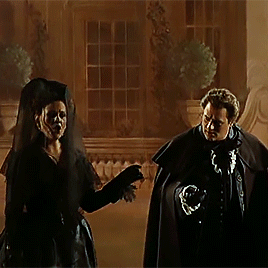
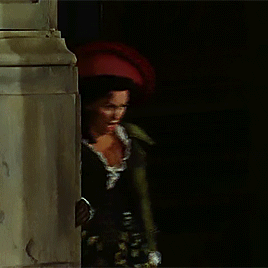
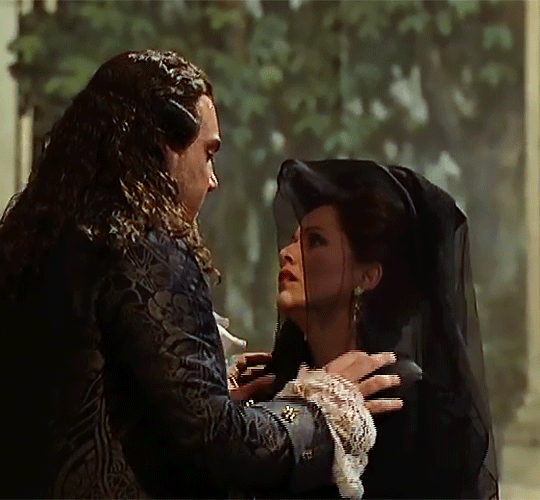
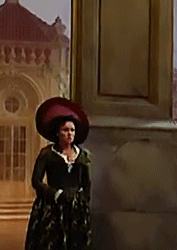
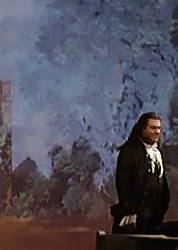
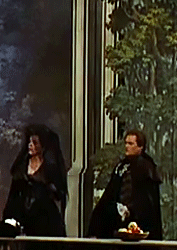
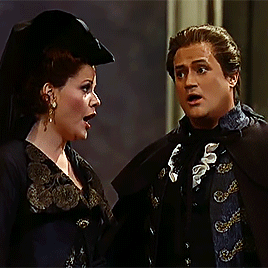
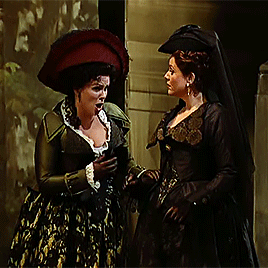


Index - Next Scene
#GIFetto#Don Giovanni#wolfgang amadeus mozart#orchestra#Opera#Donna Anna#Renée Fleming#Don Ottavio#Paul Groves#Donna Elvira#Solveig Kringelborn#Bryn Terfel#Met Opera
4 notes
·
View notes
Text
Anna Goryachova was born in Leningrad (Saint-Petersburg). In 2008 she graduated with distinction from the Vocals Faculty of the Rimsky-Korsakov St Petersburg State Conservatory (class of Tamara Novichenko and subsequently class of Galina Kiseleva). From 2009 to 2011 she trained under Renata Scotto and Anna Vandi at the Accademia Nazionale di Santa Cecilia (Rome) and also under Romualdo Savastano at the A.R.T. Musica academy (Rome). From 2008 to 2011 Anna was a soloist at the Mikhailovsky Theatre and the St Petersburg Chamber Opera. In 2010 she was nominated for Russia’s Golden Mask National Theatre Award for her performance of the role of Donna Elvira in the opera Don Giovanni staged by Yuri Alexandrov. In 2011 under the direction of Alberto Zedda she made her debut at the Vlaamse Opera (Flemish Opera) in Antwerp as the Marchesa Melibea (Il viaggio a Reims, Mariame Clément’s production). From 2012 to 2017 Anna was a soloist at the Opernhaus Zürich, where she performed the roles of Adalgisa (Bob Wilson’s production of Norma), Rosina (Rossini’s Il barbiere di Siviglia), Polina (The Queen of Spades), Magdalena (Die Meistersinger von Nürnberg), Zerlina (Don Giovanni), Eustazio (Handel’s Rinaldo), Zelim (Vivaldi’s La verità in cimento), Masha (Eötvös’ Three Sisters), Marchesa Melibea and so many others. She has collaborated with such conductors as Teodor Currentzis, Nello Santi, Fabio Luisi, Alain Altinoglu, Enrique Mazzola, Riccardo Frizza, Ottavio Dantone, Stefano Montanari and Daniele Rustioni among others. Took part in the world premiere of Christian Jost’s opera Rote Laterne (2015). In 2012 Anna sang the role of Alcina (Orlando paladino) at the Théâtre du Châtelet in Paris and made her debut at the Rossini Festival in Pesaro (Italy) as Edoardo (Matilde di Shabran) staged by Mario Martone and conducted by Michele Mariotti. In 2020 at the Grand Théâtre de Genève she sang the roles of Angelina (La Cenerentola) and Sesto (La clemenza di Tito, staged by Milo Rau) in addition to making her debut at the Vienna State Opera in the role of Olga (Dmitri Tcherniakov’s production of Eugene Onegin); in Vienna she subsequently performed the roles of Angelina and Carmen. In 2022 as Angelina she made her debut at the Mariinsky Theatre (St.Petersburg). In the 2020–21 season Anna received Valencia’s “Best Mezzo-Soprano of the Season” award for the role of Angelina in La Cenerentola, staged by Laurent Pelly at the Palau de les Arts Reina Sofía.
We all know that this has been a pretty tough time for the socio-political environment, which affected also the arts in a considerable way, and it was so beautiful to see you and your Ukrainian colleague hugging each other during the standing ovation. What do you think about this matter, about the way theaters, but also the society, took actions towards the Russian artists?
Honestly, during these 3 months I have never found any change of attitude from my colleagues, nor from the theaters. The political conflict should not affect the cultural environment.
Indeed, you all seemed such an united team on stage and behind it! Was it your first Carmen in the amazing production of Calixto Bieito, which such a passionate stage parter as Vittorio Grigòlo, for his debut at Don José?
There was such an amazing energy coming from the stage towards us, in the audience! Thank you so much, I already sung in this production in Madrid in 2017. It’s a very intense staging. And I was very much touched to see the standing ovations in Wiener Staatsoper every evening. I never met Vittorio before and we really enjoyed playing and singing together. It was a perfect artistic match, I think! I adore Vittorio! He is not only an incredibly talented artist, but he is also a very nice person offstage. And his role debut was sensational!
reposted from https://opera-charm.com/
0 notes
Video
youtube
Erwin Schulhoff (1894-1942): Flammen, tragicommedia in due Atti e 10 Quadri su libretto di Karel Beneš nella traduzione in tedesco di Max Brod (1932).
Primo Atto: Introduzione Scena 1: Notturno Scena 2: Lied des Feuers Scena 3: Mitternachtsmesse Scena 4: Chimäre Scena 5: Galerie Scena 6: Dialog Scena 7 (a): Sturm Scena 7 (b): Gespräch mit dem Meer.
Don Juan: Kurt Westi Donna Anna: Jane Eaglen La Morte: Iris Vermillion Der Komthur: Johann-Werner Prein Harlekin: Gerd Wolf Schatten: Cecilia Lindsley, Carola Höhn, Regina Schudel, Elvira Dreßen, Christiane Berggold, Kaja Borris.
Rias-Kammerchor Berlin (Marcus Creed chorus Master) Deutsches Symphonie-Orchester Berlin Direttore: John Mauceri.
0 notes
Text


did Not enjoy that but it was an experience nonetheless <3
#personal#face#donna elvira i am free tonight on this friday night my address is ** ****** ****** ****** liverpool uk tonight on this friday night <3
0 notes
Photo

HEY THERE, JOHNNY BOY- I HOPE YOU FRY!
#seeing This live in three days so. drew something to get myself in the mood :) ft oingo boingo#don giovanni#opera tag#donna anna#don ottavio#donna elvira#leporello#masetto#zerlina#(although. the last 3 are only in there by way of symbolism i guess)#misc scribbling
33 notes
·
View notes
Note
happy sleepover saturday!! hope your day’s been treating you okay friend <3 some sleepover questions for you: what characters are living rent free in your mind these days? if a small songbird landed on your head what would you do? and do you have any favorite pens/pencils? (also sola farmer's market update bc for some reason you're always the person i want to tell abt them: i didn't go this week but apparently the indoor market in my neighborhood just got a jewish deli stall? i am very excited)
happy sleepover saturday! i had a good lesson and got some spinach from the farmers market this morning which was nice, but most of the rest of the day i spent curled up in my room with a migraine :(
right now taking up the most real estate in my brain are don giovanni leporello and donna elvira from the opera don giovanni (rotating around in there like shawarma). but i've also been thinking abt the celestine secrets crew today...i miss them...
ough my favorite pens. i have a shiny teal fountain pen that i got as a birthday gift in highschool, currently filled with red ink but i change colors every semester or so. i use this pen for nearly all of my notetaking at school because i find that writing with a fountain pen is much less taxing on my hand than a pencil or ballpoint for long periods of time, especially important now that i'm playing EH more regularly (the instrument is quite heavy and its weight rests almost entirely on my writing hand, which is a lot of strain on the wrist/thumb). my fave ballpoint pen is this cool metal and wood one i got from a lathe worker at a local crafts fair. the body is made from turned poison ivy wood (totally safe to handle, since it's stripped of the usual oils that cause skin irritation)! i used to have a cool turned wood mechanical pencil from the same guy but it got lost :( generally i just like to use any mechanical pencil for writing and drawing. i like the papermate ones, they have a decent grip on them.
[ask meme]
#sasha answers#ask meme#sleepover saturday#sezruedotter#ty!!#i Always want to hear about your famers market adventures. Always#you should get a bagel next time you go [quest added]
3 notes
·
View notes
Note
Top 5 sopranos <3
damn. i can't. im gonna try and not cheat but idk
1. Renata Tebaldi (duh)
2. Joan Sutherland (preferably young Sutherland, up to like mid-1960s when you could still somewhat hear actual words in her singing dkdhdndhn but i love her always)
3. Rosa Ponselle and Claudia Muzio (i love them both and they're kinda the same time period category but if I had to choose. yeah, Ponselle)
4. Marcella Sembrich-Kochańska and Luisa Tetrazzini and Nellie Melba (I CANT CHOOSE. they're my holy trinity of Ancient Goddesses of Coloratura - I'd say, objectively, Tetrazzini was the best when it comes to pure vocal technique, but Sembrich is the one closest to my heart so. Sembrich)
4. Edda Moser and Carol Vaness (they're THE Mozart sopranos. they never held anything back, always gave 100% of drama and full voiced singing, and that's THE ONLY WAY to sing Mozart. period. Moser ultimately wins because she's been with me from the very beginning, was one of my very first favourite singers, and she's ruined all Queens of the Night for me and her recording of Martern aller Arten makes me wanna scream and kill and maim like no other. I listened to her long before I even touched Tebaldi or Sutherland etc. and I'm very nostalgic about her. but Vaness is honestly so good too y'all, THE Fiordiligi and Vitellia, no one comes close to her in these roles, and also one of my two most favourite Donna Elvira-s actually).
5. Antonietta Stella (couldn't decide whether to put Nilsson, Flagstad or her but while I do think both N and F were Objectively better sopranos, I decided to go with my heart and my heart loves Stella forever and always. the problem with her is that, she either sings something absolutely wonderfully with a wall of huge, pure, beautiful, unrestricted sound, or she fucks up completely, rarely anything in between. but I just love her, I do, no matter what)
i feel so guilty for not including so many others of my favourites so im gonna mention them in the tags just to ease my conscience lol
#Birgit Nilsson and Kirsten Flagstad aka The Only Singers Who Could Actually Make Me Listen To W*gner#Renata Scotto. screeches like a banshee at times but i love her. say what you want but she's a total camp drama queen and i ADORE that#Virginia Zeani <33333 amazing and very underappreciated. also she looks so much like my mom when she was younger it's actually kinda creepy#Anna Moffo. she's so cute and she was also one of my very first opera crushes.#Lisa Della Casa and Elisabeth Grümmer. a bit gentler than Moser and Vaness but I love their Mozart too.#and ok. ok im gonna say it. ehhhhh.#pre-weight-loss Callas so up to like mid 1950s. 1960s are already a no no. she was. indeed. Very Good.#but never The Best and ill die on this hill.#and ugh. there are so many wonderful sopranos and dont even get me started on the mezzos. making me choose just 5 is cruel#but thank you <333#Bea ill get to your other asks tomorrow mwah thank youuuuuu ❤️#ask#opera tag
11 notes
·
View notes
Photo

Today In History Among the most compelling operatic soprano of our time, Roberta Alexander enjoys international renown for her riveting, incisive characterizations, miraculous vocal and dramatic range. Born March 3, 1949, Alexander studied at the University of Michigan in Ann Arbor from 1969 to 1971, receiving M. Music in 1971, and with Herman Woltman at the Royal Conservatory of Music at The Hague. She was a leading soprano at the Metropolitan Opera from 1983 to 1991. In addition to principal Mozart roles like Countess Almaviva, Elettra, Fiordiligi, and Donna Elvira, she had particular success with the parts of Mimì in Puccini's La bohème and the title role in Janáček's Jenůfa. More recently she has performed secondary character roles on stage, including performances at the Grand Théâtre de Provence in 2013, La Scala in 2014, and La Monnaie in 2015. She performed the Fifth Maid in Strauss's Elektra at the Met in 2016 and Curra in Verdi's La forza del destino at the Royal Opera House, Covent Garden, in 2019. CARTER™️ Magazine carter-mag.com #wherehistoryandhiphopmeet #historyandhiphop365 #cartermagazine #carter #robertaalexander #blackhistorymonth #blackhistory #history #womenshistorymonth #staywoke https://www.instagram.com/p/Cao-W3jrx3V/?utm_medium=tumblr
#wherehistoryandhiphopmeet#historyandhiphop365#cartermagazine#carter#robertaalexander#blackhistorymonth#blackhistory#history#womenshistorymonth#staywoke
8 notes
·
View notes
Note
for the character opinions (spinning a wheel) donna elvira?
"gli vo cavare il cor" is so (chef's kiss) to me somehow
also she gets some of the best music in the opera <3

2 notes
·
View notes